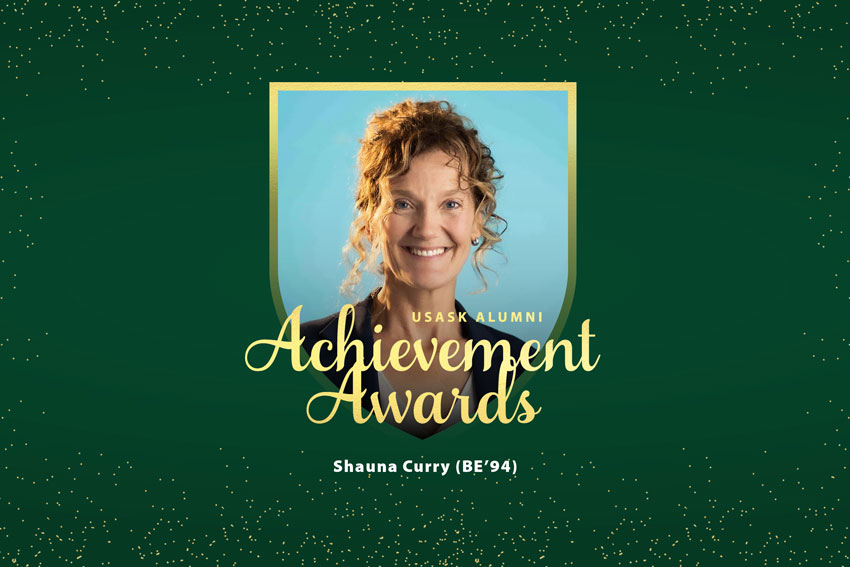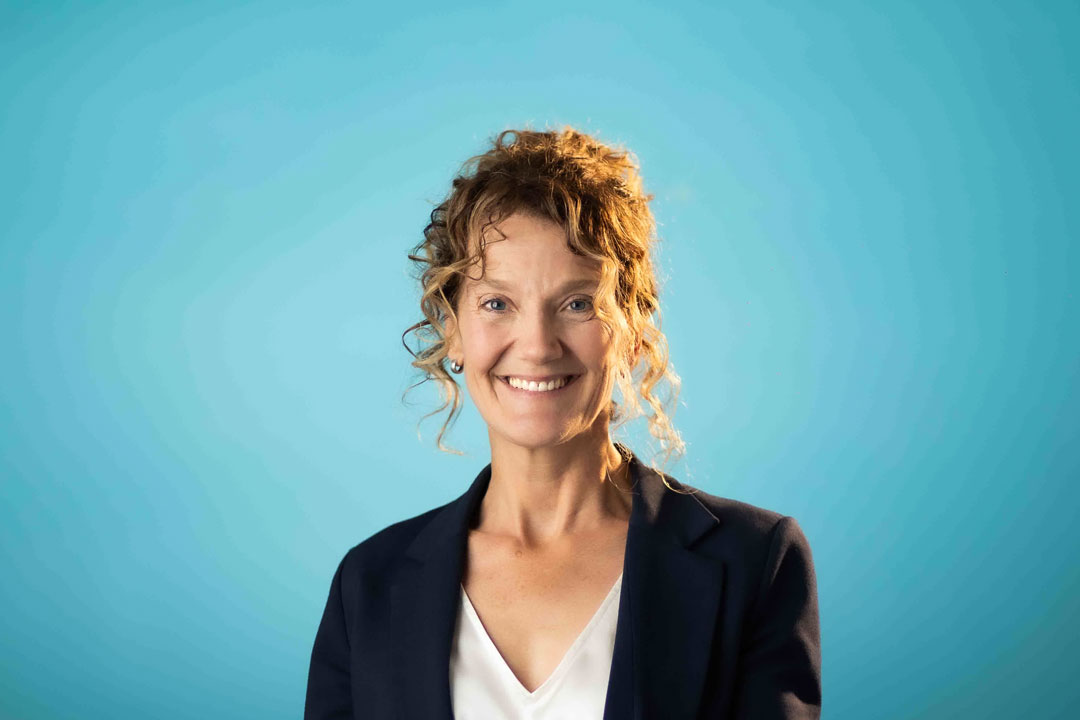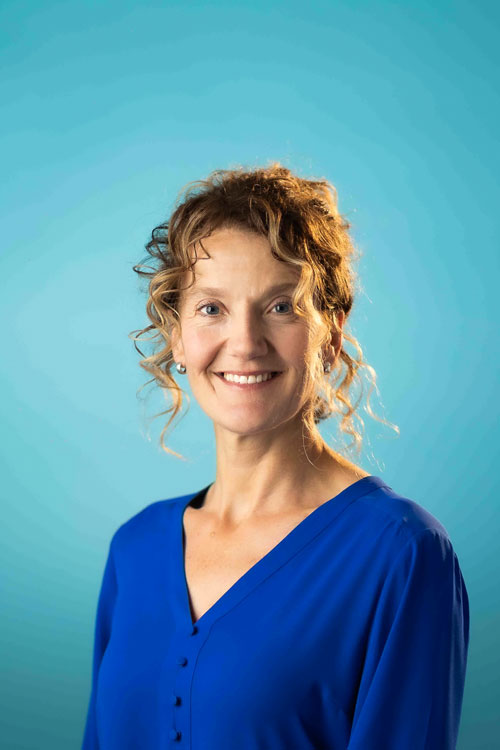
5 things to know about Alumni Achievement Award winner Shauna Curry
Curry received the Outstanding Impact Award at the 2023 USask Alumni Achievement Awards.
By Donella HoffmanSince earning her degree in agriculture engineering from the University of Saskatchewan College of Engineering (USask Engineering), her career has led her to the Calgary-based Centre for Affordable Water and Sanitation Technology (CAWST). As CEO, she leads a team that works to bring safe water, sanitation and hygiene to millions of people around the world.
Curry received the Outstanding Impact Award at the 2023 University of Saskatchewan (USask) Alumni Achievement Awards on Octiber 19 in Saskatoon. Hear from her nominators in this two-minute video.
Here are five things to know about this professional engineer who has always been driven to solve real-world problems.

1. She grew up on the USask campus.
There was never any doubt Curry would attend university, nor was there much question about which one.
Though she was born in Winnipeg, Curry’s parents Bill Curry and Dale Dewar, were USask students – her dad in Human Ecology and her mom in medicine – while she was a baby and toddler.
“I was raised basically on the campus,” she said in a recent interview.
Her dad was a seasoned development worker, having volunteered in Africa, so the family often spent time in the USask international centre.
“From a young age, I was exposed to a range of different people from all over the world – speaking different languages, wearing traditional clothing and sharing their culture in a variety of ways. The community that was cultivated at the university was inspiring,” Curry recalled. “And the experience exposed me to the complexity of inequality, including conflict, social, political and environmental issues.”
2. Being a problem-solver and leader are in Curry's DNA.
Like a lot of high school students, Curry didn’t know much about engineering, but her mom, by then a physician, and her engineer uncle filled in some blanks for her. “The prevailing message was that as soon as you step through the door of the Engineering college, you’re immersed in a culture of problem-solving.”
This resonated with Curry.
“Because I wanted to solve real-world problems at the root cause, I felt it was a good path for me.”
As Curry began her Engineering degree, her leadership instincts pulled her toward student government.
“Even as a little kid, as young as Grade 2, I was drawn to taking leadership roles. For as long as I can remember, I’ve been driven to make improvements in the world around me.”
Encouragement from profs and senior students propelled Curry to serve as vice-president, then president of the Saskatoon Engineering Students’ Society. She also spent a year as vice-president of the Canadian Federation of Engineering Students.
“It was fun and highly creative. It tapped into a different part of my brain,” said Curry of her leadership roles.
After completing her Engineering degree, she returned to campus for a year to take some Commerce classes and topped off her student government resume by serving as president of the University of Saskatchewan Students’ Union.
3. When her inner voice told her she should ride her bike to Latin America, she listened to it.
Five or so years into her engineering career, Curry was in Calgary and thinking hard about where she was headed professionally. Her inner dialogue led her to an inescapable conclusion.
“I was thinking, ‘I want to learn Spanish. I want to go to Latin America. If this is important to me, I should just go do it.’ ”
About three months later, she was on her bicycle, pedalling south from Alberta, headed toward Latin America.
Curry was away from 1999 to 2001, travelling 14,000 kilometres through 14 countries. She estimates she was in transit for 13 months and stopped for 11 over the two years, spending her time volunteering or exploring. Her longest stay was five months in Ecuador, recuperating after an accident on her bicycle left her with a broken collarbone.
Though frustrated at the time, Curry is grateful now for that respite, since she met new people and visited the Amazon. It also led her to change her route to the high altitudes of the Andes, which was, in a word, “incredible.”
“My experience was as rich as it was because of everything that happened.”
4. She relishes her time on the ground in the countries CAWST serves.

As she pedalled through South America, Curry’s experiences drove home the reality that safe water is fundamental to a healthy community.
After she returned to Canada, she discovered CAWST, the non-profit founded in 2001 by Camille Dow Baker and David Manz (BE’72, MSc’74). Manz invented the household biosand filter, an adaptation of the traditional slow sand filter that uses layers of sand and gravel to remove pathogens and suspended solids from contaminated drinking water.
CAWST was founded for humanitarian distribution of the filter. Today, the organization estimates that more than 1.7 million biosand filters have been implemented in 60-plus countries, benefitting tens of millions of people.
Curry joined CAWST in 2004 as an international technical advisor, then became director of international services before being asked to put her name forward to become CEO when Dow Baker, also an engineer, retired in 2011.
“It was a big decision because I knew it would mean less travel and working directly with people who are solving their local community issues and challenges. That is something that I did and still really love about our work. When I travel it keeps me connected to our cause and feeds my soul,” Curry said.
Ernie Barber, formerly an engineering faculty member and USask provost, admires Curry’s dedication to CAWST.
“I'm inspired by her commitment to take on a problem that is both as simple and as complex as making sure that everybody in the world has access to safe drinking water and sanitation,” he said.
“Shauna could do anything she wanted. . . . and she chose to work with some of the most vulnerable in the world with a not-for-profit.”
5. Curry's education at the College of Engineering laid the foundation for the work she does today.
She is unequivocal when asked if her Engineering education helped her develop the tools she’s needed in her career.
“Yes, 100 percent. The knowledge and skills that we get from the classroom and the labs, combined with the engineering ethics and being of service, the focus on problem-solving and making the world a better place, enabled me to further develop the ability to take initiative on almost anything.”
Today, that means leading the CAWST team as it supports people in low- and middle-income countries who are striving to bring basic water and sanitation to their communities.
“That's the inspiration. There are thousands of people around the world who want to do this, and we can be the catalyst,” said Curry.
“We can be the support, we can be the cheerleader, not unlike the professors that were my cheerleaders supporting me.”

